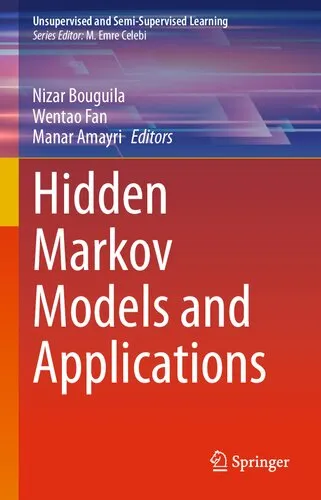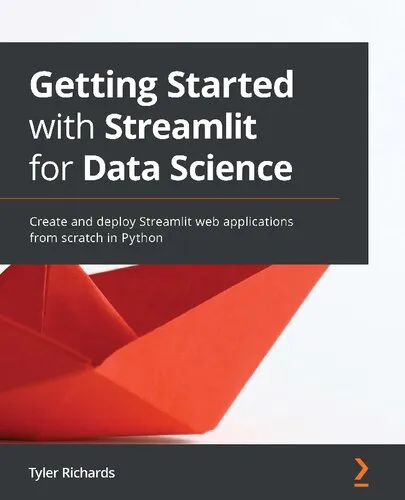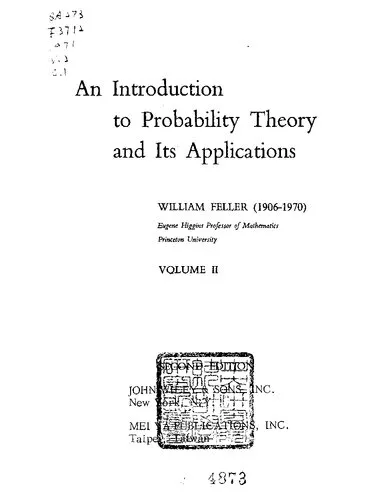Hidden Markov Models and Applications (Unsupervised and Semi-Supervised Learning)
4.0
بر اساس نظر کاربران

شما میتونید سوالاتتون در باره کتاب رو از هوش مصنوعیش بعد از ورود بپرسید
هر دانلود یا پرسش از هوش مصنوعی 2 امتیاز لازم دارد، برای بدست آوردن امتیاز رایگان، به صفحه ی راهنمای امتیازات سر بزنید و یک سری کار ارزشمند انجام بدینکتاب های مرتبط:
مقدمهای بر کتاب "Hidden Markov Models and Applications (Unsupervised and Semi-Supervised Learning)"
کتاب "Hidden Markov Models and Applications (Unsupervised and Semi-Supervised Learning)" یکی از جامعترین منابع بهروز در حوزه مدلهای مخفی مارکوف (Hidden Markov Models یا HMM) و کاربردهای آنها در یادگیری بدون ناظر (Unsupervised Learning) و نیمهنظارتی (Semi-Supervised Learning) است. این کتاب با هدف ارائه دانش عمیق و کاربردهای عملی مدلهای پیچیده آماری، توسط سه نویسنده برجسته، نزار بوگیلا، ونتائو فان و منار امیری نگاشته شده است.
خلاصهای از این کتاب
این کتاب مروری جامع و کاربردی بر Hidden Markov Models ارائه میدهد. کتاب در ابتدا به مبانی نظری و ریاضی مدلهای مخفی مارکوف میپردازد و سپس پیادهسازیهای واقعی آن، بهویژه در زمینههای پردازش صوت، تشخیص گفتار، تحلیل دادههای سری زمانی و علوم زیستی بررسی میشود. یکی از نکات برجسته این اثر، بهرهگیری از روشهای یادگیری بدون ناظر و نیمهنظارتی برای آموزش مدل ها در موارد کمبود دادههای برچسبگذاریشده است. این موضوع بهویژه در محیطهای واقعی که برچسبگذاری دستی دادهها گران یا دشوار است، اهمیت بسیاری دارد.
این کتاب، ترکیبی از مفاهیم آموزشی و تحقیقاتی پیشرفته در زمینه مدلهای مخفی مارکوف و الگوریتمهای مربوطه ارائه میدهد. همچنین نحوه استفاده از مواردی نظیر الگوریتم Viterbi، مدلسازی مشاهدات گسسته و پیوسته، و مدلهای مارکوف ترکیبی بهطور دقیق تشریح شده است.
نکات مهمی که میآموزید
- درک اصول بنیادین Hidden Markov Models و تفاوتهای اساسی آن با سایر مدلهای آماری.
- آشنایی با الگوریتمهای اساسی همچون Forward-Backward Algorithm، Viterbi Algorithm و Baum-Welch Algorithm.
- کاربرد یادگیری بدون ناظر و نیمهنظارتی در حوزههای مختلف از جمله بینایی ماشین و شناسایی الگو.
- روشهای کاهش پیچیدگی محاسباتی و بهبود دقت در مدلهای مخفی مارکوف.
- بررسی مسائل عملی واقعی و چگونگی استفاده از HMM در این مسائل، مانند بیوانفورماتیک یا تحلیل سریهای زمانی مالی.
نقل قولهای معروف از کتاب
"In the world of probabilistic models, Hidden Markov Models stand as powerful frameworks to uncover the hidden structures of sequential data, from DNA sequences to speech signals."
"The power of semi-supervised learning lies in its ability to leverage both labeled and unlabeled data, breaking traditional barriers of data limitations."
چرا این کتاب مهم است؟
با توجه به توسعه روزافزون حوزه هوش مصنوعی و یادگیری ماشین، نیاز به مدلهای قدرتمند برای استخراج اطلاعات از دادههای پیچیده بیشتر از همیشه حس میشود. مدلهای مخفی مارکوف یکی از مؤثرترین و پرکاربردترین ابزارها برای این منظور هستند. این کتاب نه تنها برای پژوهشگرانی که با HMM سروکار دارند، بلکه همچنین برای مهندسان، دانشجویان و علاقهمندان به تحلیل دادههای پیچیده مفید است.
این کتاب، پلی میان تئوری و عمل برقرار میکند و با ارائه مثالهای دنیای واقعی، توانسته است کاربردیترین نکات را به شکلی قابل فهم و روان شرح دهد. اهمیت کتاب در این است که با روشهای ترکیبی و جایگزینی که برای دادههای کم یا ناقص پیشنهاد داده است، توانسته بر محدودیتهای متداول غلبه کند.
Introduction to "Hidden Markov Models and Applications (Unsupervised and Semi-Supervised Learning)"
In an era dominated by data-driven insights, machine learning has become an indispensable tool for solving complex problems across various domains. Among the many foundational methodologies in modern artificial intelligence, Hidden Markov Models (HMMs) stand out as a cornerstone for dealing with sequential and temporal data. "Hidden Markov Models and Applications (Unsupervised and Semi-Supervised Learning)" delves into the theoretical underpinnings, practical implementations, and diverse applications of HMMs in both unsupervised and semi-supervised learning paradigms.
This book serves as both a comprehensive introduction and an advanced reference guide, offering readers a blend of theory and practice. Written with contributions from experts in the field, it ensures a balance between mathematical rigor and interpretability, making it suitable for beginners, researchers, and industry professionals alike. Whether you are exploring natural language processing, bioinformatics, speech recognition, or even financial modeling, this book provides the essential tools to understand and implement HMM-based solutions.
Summary of the Book
The book begins by laying a solid foundation for understanding HMMs, starting with the core concepts of Markov chains, probability distributions, and the role of latent (hidden) variables. The early chapters are dedicated to explaining the mathematical constructs that empower HMMs, such as the forward-backward algorithm, Viterbi decoding, and Baum-Welch training. Each concept is explained in depth, with illustrative examples and pseudo-code tailored to guide implementation.
Moving further, the focus shifts to the application of HMMs in unsupervised and semi-supervised frameworks. Readers will explore how these models uncover hidden patterns in unlabelled datasets, leveraging their inherent structure for clustering, sequence prediction, and anomaly detection tasks. A significant emphasis is placed on semi-supervised learning, particularly its hybrid approach of utilizing both labeled and unlabeled data, which is especially beneficial when labeled datasets are scarce or expensive to produce.
Real-world applications span a wide array of fields, and this book leaves no stone unturned. Detailed case studies and examples highlight the role of HMMs in speech and handwriting recognition, bioinformatics (such as protein structure prediction), finance (including time-series modeling), and even robotics (for motion planning and localization). Each application is explored thoroughly, with explanations on how HMMs adapt to unique domain challenges. The book concludes with a forward-looking perspective, discussing future advancements and how HMMs integrate with deep learning architectures such as recurrent neural networks and transformers.
Key Takeaways
- Understand the theoretical foundations of Markov models and their extension to hidden states.
- Master key algorithms such as forward-backward, Viterbi, and Baum-Welch for efficient modeling and training.
- Gain insights into unsupervised learning for clustering and sequence modeling without reliance on labeled data.
- Explore the innovative use of HMMs in semi-supervised learning to enhance model performance with limited labeled data.
- Apply HMMs to various real-world problems, spanning fields like natural language processing, robotics, and financial modeling.
- Bridge classical statistical modeling with modern techniques such as deep learning for improved capabilities.
Famous Quotes from the Book
"Hidden Markov Models represent one of the most elegant and powerful frameworks for representing and predicting structured data, where uncertainty plays a central role."
"The beauty of unsupervised and semi-supervised learning lies in their ability to do more with less: less labeled data, less prior knowledge, but still uncovering profound patterns."
"The seamless integration of HMMs with contemporary AI architectures opens doors to possibilities we have yet to fully explore."
Why This Book Matters
As the demand for intelligent systems grows, the ability to analyze, predict, and solve problems in dynamic environments becomes a critical necessity. Hidden Markov Models have stood the test of time as an essential tool, bridging the gap between theory and application. This book matters because it provides a pathway for students, academics, and professionals to not only grasp HMMs conceptually but to also apply them effectively in their respective disciplines.
The unsupervised and semi-supervised learning focus is particularly relevant in today's data landscape, where labeled datasets are often incomplete or unavailable. The methodologies presented in this book empower readers to extract meaningful insights from such data, accelerating innovation in fields from healthcare to financial technology.
Moreover, the text goes beyond conventional application, showcasing the evolving role of HMMs. By addressing both classical usage and their synergy with modern machine learning techniques, the book ensures that readers stay ahead of trends and challenges. It is both a timeless resource and a forward-thinking guide for the machine learning community.
دانلود رایگان مستقیم
شما میتونید سوالاتتون در باره کتاب رو از هوش مصنوعیش بعد از ورود بپرسید
دسترسی به کتابها از طریق پلتفرمهای قانونی و کتابخانههای عمومی نه تنها از حقوق نویسندگان و ناشران حمایت میکند، بلکه به پایداری فرهنگ کتابخوانی نیز کمک میرساند. پیش از دانلود، لحظهای به بررسی این گزینهها فکر کنید.
این کتاب رو در پلتفرم های دیگه ببینید
WorldCat به شما کمک میکنه تا کتاب ها رو در کتابخانه های سراسر دنیا پیدا کنید
امتیازها، نظرات تخصصی و صحبت ها درباره کتاب را در Goodreads ببینید
کتابهای کمیاب یا دست دوم را در AbeBooks پیدا کنید و بخرید
1434
بازدید4.0
امتیاز0
نظر98%
رضایتنظرات:
4.0
بر اساس 0 نظر کاربران
Questions & Answers
Ask questions about this book or help others by answering
No questions yet. Be the first to ask!







![The Ultimate iOS Interview Playbook: Conquer Swift, frameworks, design patterns, and app architecture [Team-IRA]](https://s3.refhub.ir/images/thumb/The_Ultimate_iOS_Interview_Playbook__Conquer__29925.webp)






